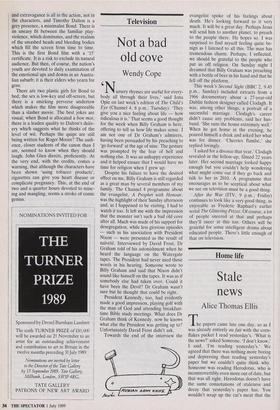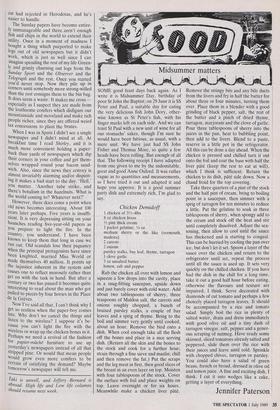Home life
Stale news
Alice Thomas Ellis
The papers came late one day, so as I was already entirely au fait with the corn- flakes packet I read yesterday's. 'What is the news?' asked Someone. 'I don't know,' I said, 'I'm reading yesterday's.' We agreed that there was nothing more boring and depressing than reading yesterday's paper but we couldn't quite think why. Someone was reading Herodotus, who is incontrovertibly even more out of date, but that was all right. Herodotus doesn't have the same connotations of staleness and decay that yesterday's paper has. You wouldn't wrap up the cat's meat that the
cat had rejected in Herodotus, and he's easier to handle.
The Sunday papers have become entire- ly unmanageable and there_ aren't enough fish and chips in the world to extend their utility. Once in a moment of madness I bought a thing which purported to make logs out of old newspapers but it didn't work, which is just as well since I can Imagine spending the rest of my life Green- ly and grimly churning out logs from the Sunday Sport and the Observer and the Telegraph and the rest. Once you started you'd never stop. Now they pile up in corners until somebody more strong-willed than the rest consigns them to the bin bag. It does seem a waste. It makes me cross especially as I suspect they are made from the loathsome conifers which disfigure our mountainside and moorland and make rich people richer, since they are offered weird tax concessions to plant the brutes.
When I was in Spain I didn't see a single newspaper and I didn't mind at all. At breakfast time I read Shirley, and it is much more convenient holding a paper- back than yards of newspapers which dip their corners in your coffee and get them- selves wrapped round your bacon sand- wich. Also, since the news they convey is almost invariably alarming and/or dispirit- ing it makes a bad start to the day. 'Hell,' You mutter. 'Another tube strike, and there's botulism in the hazelnuts. What is the world coming to? Whatever next?' However, there does come a point when old news becomes interesting. About 100 years later perhaps. Five years is insuffi- cient. It is very depressing sitting on your haunches reading five-year-old papers as you prepare to light the fire. In the country, you understand, I have been known to keep them that long in case we run out. Old scandals lose their piquancy when the principal protagonists have since been knighted, married Miss World or made themselves 40 million. It points up the injustice inherent in the system and causes one to reflect morosely rather than get on with the task in hand. But after a century or two has passed it becomes quite interesting to read about the man who got pulled to pieces by four horses in the Place de la Greves.
Now I've said all that, I can't think why I get so restless when the paper-boy comes late. Why don't we cancel the things and listen to the wireless? I suppose it's be- cause you can't light the fire with the wireless or wrap up the chicken bones in it. Perhaps we need a revival of the fashion for papier-mache furniture to use up yesterday's newspapers instead of all that stripped pine. Or would that mean people would grow even more conifers to be certain of satisfying the demand? Maybe tomorrow's newspaper will tell me.











































 Previous page
Previous page